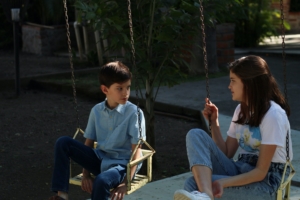We don’t ever discuss biological family in a negative way. There are plenty of ugly things someone could think about my kids’ biological parents. We adopted from foster care. The circumstances were not ideal—they never are in adoption. Our kids faced adversity after adversity for the first several years of their lives. Their biological family couldn’t provide a safe environment for them. It’s tragic, but it’s true. But our kids don’t need to carry the burden of that knowledge. When they ask about their biological family, we say, “they loved you but they didn’t know how to make safe choices so the judge thought it was better if you lived with another family that could make safe choices.”
It’s not a perfect answer. There is still room for further interrogation. The youngest—she’s not interested in more details. She’s been with us for as long as she can remember and is only interested in biological parents as a thought exercise. Our other kids however ask follow-up questions that, at first, made my stomach ache. “What unsafe choices?” “Why did you get us?” “Do you know them?” “Where was I born?” It makes my stomach ache because I genuinely don’t know the answer to most of those questions. I never met two of my girls’ biological parents and the kids’ parents I did meet I haven’t seen since we adopted. So, I don’t know where anyone lives or even currently looks like.
These are our reminders when speaking about our biological families.
Don’t speak negatively about them
I may have complicated feelings about my kids’ biological parents, but I don’t need to share negative feelings with my children. I never want my kids to think they aren’t good enough because their biological parents made bad choices. I also don’t want them to feel like they are in any way responsible for being removed. A child may feel that because a parent faces negative consequences because of poor choices, he or she will be treated differently.
Give honest answers
My one daughter was born in a motel. She wanted to know why. We told her. My kids wanted to know why they were taken by CPS and I found the answer and communicated it in kid-appropriate terminology.
“They didn’t have enough food.”
“They took medicine that made it really hard to know when you needed things.”
“You had medicine in your body when you were born and it made you very sick. She made an unsafe choice so the judge put you somewhere she could make safe choices again. She kept making unsafe choices so the judge said she couldn’t take care of you anymore.”
It’s not a perfect system. I’ve yet to master saying hard things without getting choked up. I hate it, honestly. I wish desperately I could undo their pain and everyone could be with their biological families. Unfortunately, I don’t have that kind of power, so I have to make due.
Don’t share unnecessary information
My kids’ histories are their own. I don’t share more than the broad strokes with anyone. If I wanted to, I could paint the entire picture for everyone. I could describe the conditions they were found in. But if I did so, it would be for selfish motivations. It would almost certainly be to make myself look better by comparison and that isn’t fair.
I don’t want them to feel negatively toward their biological families. I might struggle feeling like their biological families deserve a lot of care and consideration, but the fact remains that my children exist because of them. If their biological parents did nothing besides provide their existence, I owe them everything. The bare minimum they deserve is for me to speak respectfully of them to the kids.
When my kids are older, they will get to see their files. They will learn what the documentation we have says about their biological families. They can do whatever they want with that information. I’ll help them find their biological families if they want and help them initiate a relationship. For now, though, it would do more harm than good to let them know everything.
My older two kids were removed later in their childhoods than my younger three. They have memories of what it was like in their biological family. They remember what they endured. As of this exact moment, neither want a relationship with their biological family. That may change as they get older and have more questions. I don’t really know what, if anything at all, that would look like.
Just remember when talking about biological families with your adopted child to discuss their biological parents the way you would want yourself talked about to others. Be respectful of the fact that you only know part of the story. It may even be the part of the story you think you know is incorrect.
Never lie. Even if it feels more gentle to lie about what you know, it won’t be worth it in the long run. You will end up damaging the relationship you have with your child depending on what you say.
If your kid says something bad about their biological family, don’t just agree with them. It’s sort of like how you can be nasty to your sibling but get furious when someone else says something about them. Everyone deserves to be treated with respect.
Christina Gochnauer is a foster and adoptive mom of 5. She has a bachelor’s degree in Psychology from Letourneau University. She currently resides in Texas with her husband of 16 years, her children ages 3, 3.5, 4.5, 11, and 12, and her three dogs. She is passionate about using her voice to speak out for children from “hard places” in her church and community.
